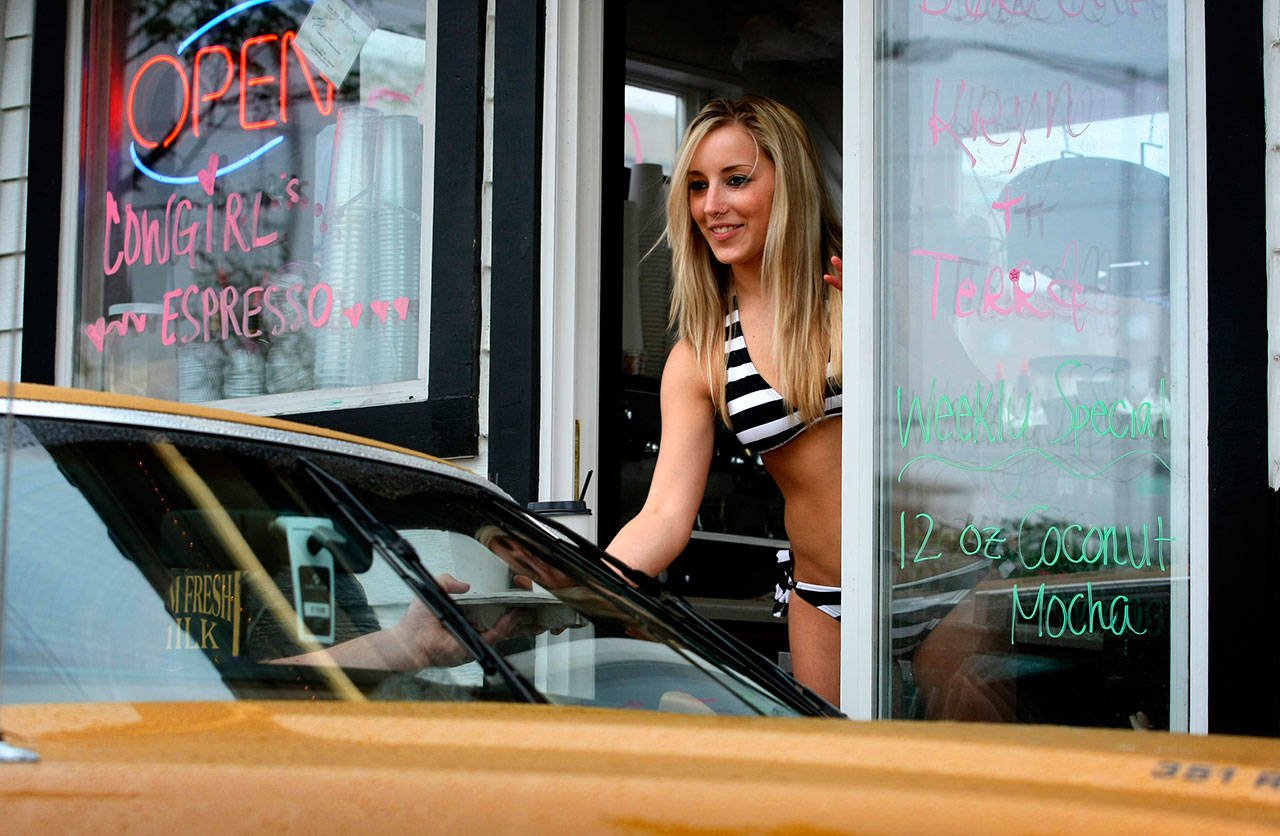By The Herald Editorial Board
More modest attire — think tank tops and shorts, as opposed to bikinis, lingerie, pasties and g-strings — could soon become the uniform for those serving up lattes and Italian sodas at certain espresso stands in Everett, following a ruling this week by a federal appellate court.
“Bikini barista” stand owners, their employees and their customers will likely continue to protest the ruling as a violation of their First Amendment rights — and can still appeal — but Wednesday’s ruling will be appreciated by parents and others who would rather do without the public peepshow for passersby of scantily clad women hanging out of stand windows.
A three-judge panel of the U.S. 9th Circuit Court of Appeals vacated an earlier federal District Court ruling that said two Everett ordinances were likely to be found unconstitutionally vague and a violation of free speech rights, as The Herald’s Stephanie Davey reported Thursday.
After years of trying to address problems with lewd conduct at some stands in Everett — including sexual performances and acts of prostitution in exchange for tips — the city adopted two ordinances in 2017: one updating its lewd conduct statutes and another directed at attire and conduct at the coffee stands.
The dress code requires baristas, male and female, to wear more modest attire, nothing more revealing than tank tops, shorts and skirts and forbidding the bikinis, lingerie and even pasties and g-strings worn by some. Rather than cite the barista for violating the dress code, the ordinance assesses a $250 fine against the stand’s owner for the first violation and requires the owner to get a probationary license to operate for a five-year period. Two or more violations would result in a $500 fine, another five years tacked onto the probationary license and possible revocation of the license.
The owner of one Everett espresso stand business, Hillbilly Hotties, and several baristas associated with the business, sued, claiming that the ordinances were vague, would be difficult to fairly enforce and would violate their right to free expression, in particular their ability to use their bodies to convey messages of “female empowerment,” “confidence” and “fearless body acceptance.”
The appellate judges disagreed.
Regarding whether the ordinances were too vague, the opinion rejects the District Court judge’s findings, and does so, well, cheekily.
The District Court judge found one description in the City of Everett’s definition of lewdness, regarding “the bottom one-half of the anal cleft,” as not well-defined or reasonably understandable.
“We reach the opposite conclusion,” the 9th Circuit opinion found. “We are not persuaded that the public will be left to guess at the meaning of the term ‘anal cleft,’ particularly because the meanings of both ‘anal’ and ‘cleft’ are easily discerned through recourse to a common dictionary.”
In other words: Look it up.
As to the baristas’ rights to freedom of expression, the appellate judges cited earlier precedent that First Amendment protections related to wearing particular clothing or insignia are only granted where there’s a “great likelihood” the message will be understood.
In the context of a retail space — in particular one where the baristas are soliciting tips — the panel found that the “message sent by the baristas’ nearly nonexistent outfits vastly diverges” from their claimed message of empowerment, confidence and body acceptance.
Again, citing precedent, the panel notes the U.S. Supreme Court, “has consistently rejected ‘the view that an apparently limitless variety of conduct can be labeled ‘speech’ whenever the person engaging in the conduct intends thereby to express an idea.’”
Unable to demonstrate their intended messages would be understood by those who view them, the judges concluded that the baristas’ attire — or lack of it — didn’t warrant First Amendment protection.
The opinion also notes that the baristas repeatedly insisted they weren’t nude dancers and weren’t engaging in erotic performances; conduct that is in fact protected under the First Amendment, just not in a setting open to public view.
There is a right to that form of speech and expression, but communities also have a right to restrict that expression through ordinances and zoning that respects the public’s right not to be exposed to those displays of “speech” if they choose.
Courts rightfully should tread carefully in regard to the First Amendment, which states clearly that “Congress shall make no law … abridging the freedom of speech.” But the courts also have a duty to protect the First Amendment from claims that would tend to dilute those rights and make them meaningless.
Talk to us
> Give us your news tips.
> Send us a letter to the editor.
> More Herald contact information.

























